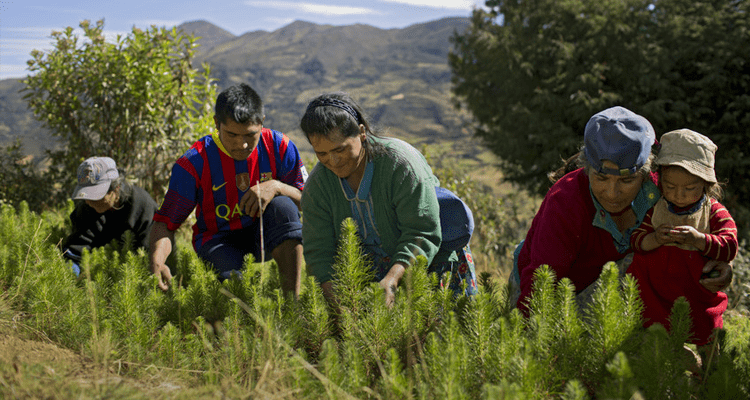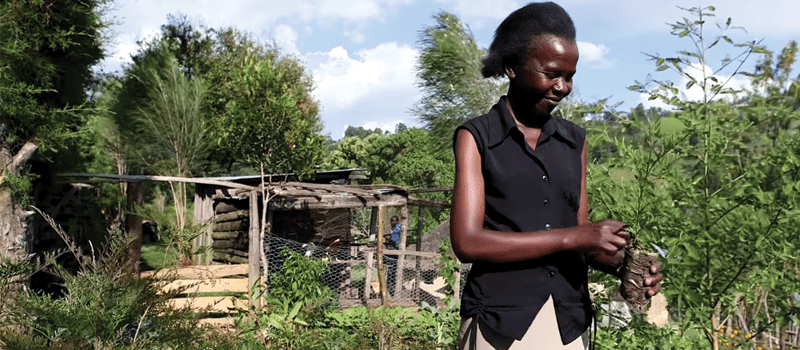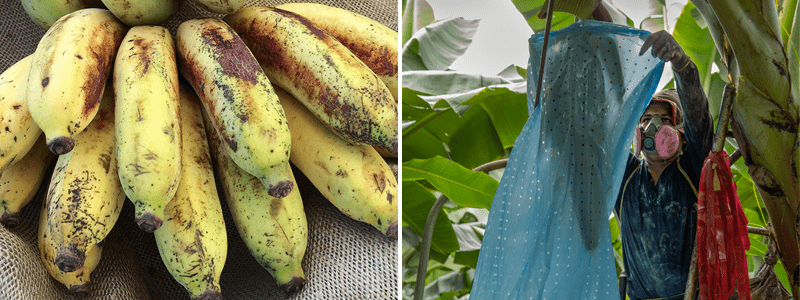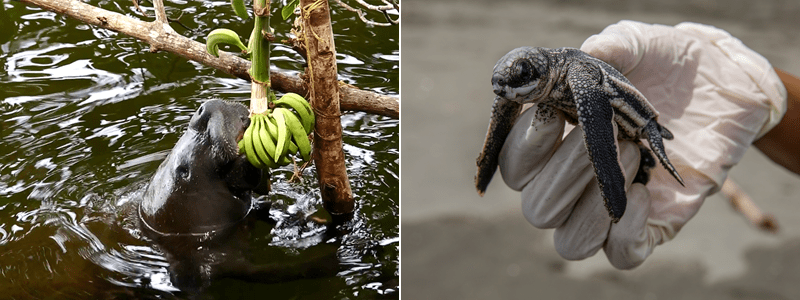8 ways Fairtrade farmers protect the environment and address the challenges of climate change
This is a summary of the full article by Heather Nicholson, 2018, from the Fairtrade Foundation website – Read it in full here

Farmers say the climate emergency is one of the major threats they face.
Environmental protection is ingrained in Fairtrade. To gain Fairtrade acceditation to sell Fairtrade products, farmers have to improve soil and water quality, manage pests, avoid using harmful chemicals, manage waste, reduce their greenhouse gas emissions and protect biodiversity. Here are eight ways Fairtrade supports farmers to survive the climate emergency and reduce their own carbon footprint.
1/ Reforestation projects to store carbon

Many Fairtrade co-operatives choose to invest their Fairtrade Premium in reforestation projects which: prevent soil erosion, bind and store carbon dioxide; improve biodiversity, protect soils, and provide a habitat for indigenous wildlife. Sireet OEP in East Africa planted 150k trees in a year alone.
2/ Prohibiting harmful agrochemicals
Fairtrade prohibits the use of certain agrochemicals that are harmful to the environment and encourages farmers to reduce their use of pesticides.
Eakiet, a Fairtrade cooperative in Vietnam, is based in a region enriched with natural resources and several national parks. Through training, the co-operative has stopped using pesticides and herbicides. They use high-pressure water to remove insects and continuously weed and prune their trees during the rainy season when the risk of pests and disease increases.
3/ Growing trees and crops together
This increases families’ farm yields and, with it, their access to food and income.
Trees provide shade for crops and when the leaves fall and decompose, they make the soil more fertile and crops get a better yield. It also enables diversified food production and helps to improve families’ nutrition, especially important for persons living with HIV. Find out more about the impact of agroforestry projects in Africa.

4/ Climate emergency adaptation training
Fairtrade promotes training on climate crisis mitigation for farmers. For example, some training offers advice on switching to environmentally friendly practices, such as developing nutrient-rich soils that support healthy plants and encouraging wildlife to help control pests and diseases.
In 2013, organic banana producers from Piura, Peru, were affected by a pest, believed to be triggered by the climate crisis. This affected 40 percent of farms and reduced exports by 30 percent. Fairtrade implemented a project to train farmers to find solutions to the outbreak, such as increasing biodiversity and using local plants to repel the insects. By the end of the project, red rust thrips were under control and the amount of discarded crop was at a minimum.

5/ Wildlife conservation projects
Coobana Co-operative in Panama uses a slice of the Fairtrade Premium they earn from selling bananas to protect endangered turtles that hatch on beaches nearby. They also protect and feed the local population of river-dwelling manatees who suffer from the high levels of pollution.

6/ Fairtrade Carbon Credits
Carbon credits in essence are tonnes of carbon dioxide that have been prevented from entering or have been removed from the atmosphere. Companies can purchase credits to take responsibility for the emissions they produce. These credits can be earnt by smallholder farmers through sustainability projects such as reforestation and switching to biogas stoves. The funding for these projects is covered by the carbon credits and the farmers receive a Fairtrade Premium. Find out more about the Fairtrade Carbon Credits.
7/ Switching to Green Energy Fuels
In Ethiopia rapid deforestation is directly related to poverty. 46 percent of felling is due to daily energy needs as, traditionally, many people cook over an open-fire, which is both harmful to the environment and women’s health. Open fires and leaky stoves causes an estimated 4.3 million premature deaths each year. Smoke kills more people than TB, HIV/AIDS and malaria combined. Oromia Co-operative in Ethiopia has taken part in the carbon credit initiative to purchase biogas stoves.
This project equipped 10,000 coffee farmers with 20,000 efficient cooking stoves. The new stoves reduce the use of firewood by 50 percent, the release of harmful soot particles by 24 – 45 percent, and carbon emissions up to 70 percent. Powered by cow dung, these biogas stoves create by-products which can be used as organic fertiliser on the farm. The cleaner air is also good for women’s health.

8/ Reducing water usage
COOCAFE co-operative in Costa Rica spent some of their Fairtrade Premium on a new water treatment system in processing plants. This new system has reduced water use from 2,000-3,000 litres per 225 kg of coffee to 200 litres.
When you buy Fairtrade, you are supporting farmers through the often devastating impact of the climate emergency. Read more on what Fairtrade does to support sustainability.
page posted – 06-09-2020; links updated – 03-04-2025
